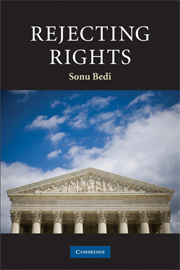Introduction
Published online by Cambridge University Press: 01 July 2009
Summary
I warn you from the outset that my argument may seem controversial, even highly counter-intuitive. After all, as my title suggests, I seek to reject rights. Yet, our intuitions here should only be thought of as knee-jerk. While they may rightly place the argumentative weight on me, they should not preempt an open mind. Like the prosecutor trying a case, I accept that the burden is mine. But just as a judge instructs jurors not to form any settled opinions of guilt or innocence until the trial is complete, I ask that you similarly withhold judgment until the end.
Imagine a polity passes the following law: blonds are forbidden from having sex with redheads. How would we respond to such a law? I'm confident that most (if not all) of us would immediately find it suspect. But why? Is it because the law violates a right to equality? That is, it discriminates on the basis of hair color. Or is it because the law violates a right to privacy? That is, it interferes with the intimate and personal decisions of redheads and blondes. I argue that the better argument stems from neither right. Rather, we need simply proclaim that the law is irrational, arbitrary even ridiculous. After all, there's no good reason for enacting it, for prohibiting blonds from sleeping with redheads. Reasons, not rights, ought to do the normative work.
- Type
- Chapter
- Information
- Rejecting Rights , pp. 1 - 10Publisher: Cambridge University PressPrint publication year: 2009



